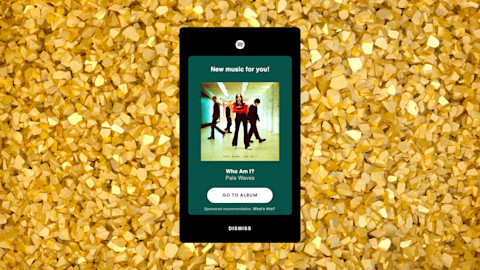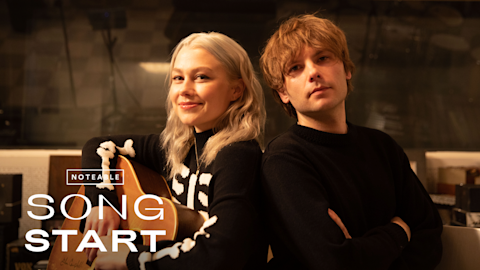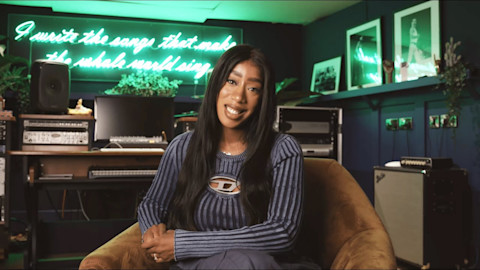Grammy-nominated band The Internet have been a crowd favorite since their 2015 album, Ego Death, captured hearts and ears, and their funk-inflected new album, Hive Mind, has anchored them within a legacy of musical collectives with staying power. It’s no secret that a major part of their appeal as a band rests on their flourishing solo careers—bandmembers Steve Lacy, Syd, Matt Martians, and Patrick Paige II each released individual efforts in between the two albums. It’s rare to witness a bunch of musicians work in silos just as successfully as they do in tandem. So we asked Martians, the band’s producer who formed the band with Syd in 2011, to give us a better idea of how it all works.
Spotify for Artists: Bandmate Steve Lacy says it was you who encouraged him to sing and make solo work. It seems like it would be counterintuitive to encourage a band member to go solo, so can you share more about the thought process behind that?
Matt Martians: Eventually everybody wants to go solo. It’s best to do it early, when you can develop your story and people can see you do both simultaneously. I know that our friendships are tight enough that we don’t mind any success that anybody’s getting because we genuinely understand our own personal paths. That’s where it starts. You have to have a bunch of people who understand their own personal paths, and who understand that everything isn’t for them. I remember when people went about it the wrong way. They waited until the band fizzled out to do their solo albums. We need to do it when people are still learning about us, so they can learn about our solo music as well. It gives more dynamic to what we’re doing as a band.
Did you also encourage Syd and Patrick with their solo albums?
Patrick has been working on solo music [since] before all of us put out solo albums, so he was already planning on doing that a long time ago. With Syd, it was similar to with Steve. She came to me and was like, “Yeah, I got these songs. I don’t know, I just want to put them on iTunes... like an EP or whatever.” And I was like, “You should just make an album. You’re going to make one eventually, so just make one.” It [was] as simple as that, as far as the conversations. Like, “Why not? Just do it, dude.”
You’ve mentioned it being an entrepreneurial approach, too.
Even though we were all able to take care of ourselves via what we make with the band, [it’s about] being able to expand yourself. What if one day something happens to one of us and we can’t be a band again? We don’t want to make albums unless it’s all five of us here. It’s good to have your own thing going. And it’s fueled by the band because we support each other. It’s about real friendships first. The myth is that you can’t have friends within this business. The problem is, people aren’t fair. You gotta be fair. If you’re fair, people will stick by you. Before we were making money, we were very open about what we were doing with the band. When we were all taking hits and not being paid, we would be like, “Well this is where the money is going,” and we would show every expense. That’s the problem with a lot of bands. They hide everything behind curtains, until it’s too late.
![Matt Martians]()
Matt Martians
How does this work logistically? Are you balancing your solo work and work for the band at the same time?
It depends. For the most part, we make solo music all the time. We all have many songs of just solo work because we all have our own places that we work at. We actually aren’t making band music all the time. That’s why the solo albums are so cohesive and didn’t take that long. It was just a matter of putting together a project.
Did you have any challenges that you faced when you went from Ego Death to working on your solo album, The Drum Chord Theory?
Not really. I had another group that I was with called the Jet Age of Tomorrow that was with Odd Future, and I used to release music back then that I used to sing on. It was more so [about] preparing myself for if it was a bad album—to have to take all the scrutiny myself. That’s the beauty of being in a band. If something sucks, we all suck. You’ve got a group of friends to take the pressure with. [If it’s] just yourself, you suck.
How do you manage touring and appearances with each musician’s personal commitments?
A lot of our fans intertwine and when somebody has something to do, we make it work. We always know the band is the top priority when the album stuff is coming around. But when the cycle is done in about a year and a half, I’m sure Steve is going to put out his solo project. We’ll put out another round of solo projects. But we always give each other space because we understand that everybody doing good solo-wise comes back to the band. Period. Those are just as important as band obligations.
You’re from Atlanta, but the rest of the band is based in L.A. Are you back and forth? Does that become an obstacle?
Nah, it’s not really that bad. Sometimes it’s tight because when we’re flying back from New York or another east coast show, I get to go home real quick. I’m used to the flight. I just take me a Benadryl and go to sleep, and I wake up in Los Angeles or I wake up in Atlanta. It’s a small price to pay for what I get to do for a living.
—Khalila Douze







